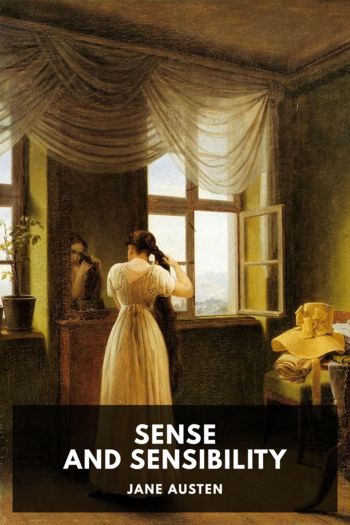Sense and Sensibility - Jane Austen (classic literature list txt) 📗

- Author: Jane Austen
Book online «Sense and Sensibility - Jane Austen (classic literature list txt) 📗». Author Jane Austen
As for Marianne, on the pangs which so unhappy a meeting must already have given her, and on those still more severe which might await her in its probable consequence, she could not reflect without the deepest concern. Her own situation gained in the comparison; for while she could esteem Edward as much as ever, however they might be divided in future, her mind might be always supported. But every circumstance that could embitter such an evil seemed uniting to heighten the misery of Marianne in a final separation from Willoughby—in an immediate and irreconcilable rupture with him.
XXIXBefore the housemaid had lit their fire the next day, or the sun gained any power over a cold, gloomy morning in January, Marianne, only half dressed, was kneeling against one of the window-seats for the sake of all the little light she could command from it, and writing as fast as a continual flow of tears would permit her. In this situation, Elinor, roused from sleep by her agitation and sobs, first perceived her; and after observing her for a few moments with silent anxiety, said, in a tone of the most considerate gentleness—
“Marianne, may I ask—?”
“No, Elinor,” she replied, “ask nothing; you will soon know all.”
The sort of desperate calmness with which this was said, lasted no longer than while she spoke, and was immediately followed by a return of the same excessive affliction. It was some minutes before she could go on with her letter, and the frequent bursts of grief which still obliged her, at intervals, to withhold her pen, were proofs enough of her feeling how more than probable it was that she was writing for the last time to Willoughby.
Elinor paid her every quiet and unobtrusive attention in her power; and she would have tried to sooth and tranquilize her still more, had not Marianne entreated her, with all the eagerness of the most nervous irritability, not to speak to her for the world. In such circumstances, it was better for both that they should not be long together; and the restless state of Marianne’s mind not only prevented her from remaining in the room a moment after she was dressed, but requiring at once solitude and continual change of place, made her wander about the house till breakfast time, avoiding the sight of everybody.
At breakfast she neither ate, nor attempted to eat anything; and Elinor’s attention was then all employed, not in urging her, not in pitying her, nor in appearing to regard her, but in endeavouring to engage Mrs. Jennings’s notice entirely to herself.
As this was a favourite meal with Mrs. Jennings, it lasted a considerable time, and they were just setting themselves, after it, round the common working table, when a letter was delivered to Marianne, which she eagerly caught from the servant, and, turning of a deathlike paleness, instantly ran out of the room. Elinor, who saw as plainly by this, as if she had seen the direction, that it must come from Willoughby, felt immediately such a sickness at heart as made her hardly able to hold up her head, and sat in such a general tremour as made her fear it impossible to escape Mrs. Jennings’s notice. That good lady, however, saw only that Marianne had received a letter from Willoughby, which appeared to her a very good joke, and which she treated accordingly, by hoping, with a laugh, that she would find it to her liking. Of Elinor’s distress, she was too busily employed in measuring lengths of worsted for her rug, to see anything at all; and calmly continuing her talk, as soon as Marianne disappeared, she said—
“Upon my word, I never saw a young woman so desperately in love in my life! My girls were nothing to her, and yet they used to be foolish enough; but as for Miss Marianne, she is quite an altered creature. I hope, from the bottom of my heart, he won’t keep her waiting much longer, for it is quite grievous to see her look so ill and forlorn. Pray, when are they to be married?”
Elinor, though never less disposed to speak than at that moment, obliged herself to answer such an attack as this, and, therefore, trying to smile, replied, “And have you really, Ma’am, talked yourself into a persuasion of my sister’s being engaged to Mr. Willoughby? I thought it had been only a joke, but so serious a question seems to imply more; and I must beg, therefore, that you will not deceive yourself any longer. I do assure you that nothing would surprise me more than to hear of their being going to be married.”
“For shame, for shame, Miss Dashwood! how can you talk so? Don’t we all know that it must be a match—that they were over head and ears in love with each other from the first moment they met? Did not I see them together in Devonshire every day, and all day long; and did not I know that your sister came to town with me on purpose to buy wedding clothes? Come, come, this won’t do. Because you are so sly about it yourself, you think nobody else has any senses; but it is no such thing, I can tell you, for it has been known all over town this ever so long. I tell everybody of it and so does Charlotte.”
“Indeed, Ma’am,” said Elinor, very seriously, “you are mistaken. Indeed, you are doing a very unkind thing in spreading the report, and you will find that you have though you will not believe me now.”
Mrs. Jennings laughed again, but Elinor had not spirits to say more, and eager at all events to know what Willoughby had





Comments (0)